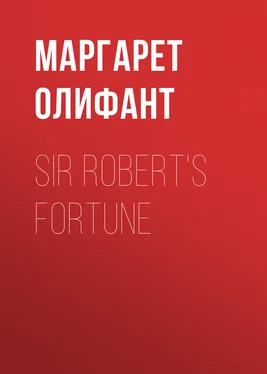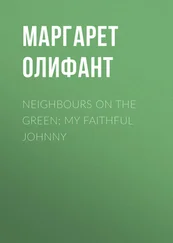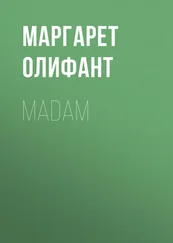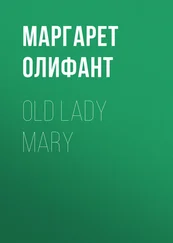Маргарет Олифант - Sir Robert's Fortune
Здесь есть возможность читать онлайн «Маргарет Олифант - Sir Robert's Fortune» — ознакомительный отрывок электронной книги совершенно бесплатно, а после прочтения отрывка купить полную версию. В некоторых случаях можно слушать аудио, скачать через торрент в формате fb2 и присутствует краткое содержание. Издательство: Иностранный паблик, Жанр: foreign_prose, literature_19, foreign_antique, на английском языке. Описание произведения, (предисловие) а так же отзывы посетителей доступны на портале библиотеки ЛибКат.
- Название:Sir Robert's Fortune
- Автор:
- Издательство:Иностранный паблик
- Жанр:
- Год:неизвестен
- ISBN:нет данных
- Рейтинг книги:5 / 5. Голосов: 1
-
Избранное:Добавить в избранное
- Отзывы:
-
Ваша оценка:
- 100
- 1
- 2
- 3
- 4
- 5
Sir Robert's Fortune: краткое содержание, описание и аннотация
Предлагаем к чтению аннотацию, описание, краткое содержание или предисловие (зависит от того, что написал сам автор книги «Sir Robert's Fortune»). Если вы не нашли необходимую информацию о книге — напишите в комментариях, мы постараемся отыскать её.
Sir Robert's Fortune — читать онлайн ознакомительный отрывок
Ниже представлен текст книги, разбитый по страницам. Система сохранения места последней прочитанной страницы, позволяет с удобством читать онлайн бесплатно книгу «Sir Robert's Fortune», без необходимости каждый раз заново искать на чём Вы остановились. Поставьте закладку, и сможете в любой момент перейти на страницу, на которой закончили чтение.
Интервал:
Закладка:
“And why will she have nothing to say to the assistant and successor? and what is his name?”
“His name is Douglas, James Douglas, of a westland family, and no that ill-looking, and well likit. Eh, but you’re keen of a story, Miss Lily, like a’ your kind. But I never said she would have naething to say to him. She is just great friends with him. They are aye plotting thegether for the poor folk, as if there was nothing needed but a minister and twa-three guid words to make heaven on earth. Oh, my bonnie lady, if it could be done as easy as that! There’s that drunken body, Johnny Wright, that keeps the merchant’s shop.” Katrin was a well-educated woman in her way, and never put f for w , which is the custom of her district; but she said chop for shop , an etymology which it is unnecessary to follow here. “But it’s a good intention—a good intention. They are aye plotting how they are to mend their neighbors; and the strange thing is– But, dear, bless us! what are we to be havering about other folk’s weakness when nae doubt we have plenty of our ain?”
“I am not to be cheated out of my story, Katrin. Do you mean that the young minister is not a good man himself?”
“Bless us, no! that’s not what I mean. He’s just as pious a lad and as weel living– It’s no that—it’s no that. It’s just one o’ thae mysteries that you’re far o’er-young to understand. She’s been keen to mend other folk, poor lass; and that the minister should speak to them, and show them the error o’ their ways! But the dreadful thing is that her poor bit heart is just bound up in a lad—a ne’er-do-weel, that is the worst of them all. Oh, dinna speak of it, Miss Lily, dinna speak of it! I’ll tell you anither time; or, maybe, I’ll no tell ye at all. Come in and see the kye. They’re honest creatures. There’s nothing o’ the deevil and his dreadful ways in them.”
“I wouldna be ower sure of that,” said Dougal, who came to meet them to the door of the byre, his cap hanging on to the side of his head, upon one grizzled lock, so many pushes and scratches had it received in the heat of his exertions. “There’s Crummie, just as little open to raison as if she were a wuman. No a step will she budge, though it’s clean strae and soft lying that I’m offering till her. Gang ben, and try what ye can do. She’s just furious. I canna tell what she thinks, bucking at me, and butting at me, as if I was gaun to carry her off to the butcher instead of just setting her bed in comfort for her trouble. None of the deil in them! What d’ye say to Rory? He’s a deil a’thegether, from the crown of his head to his off leg, the little evil spirit! And what’s that muckle cock ye’re so proud o’? Just Satan incarnate, that’s my opinion, stampin’ out his ain progeny when they’re o’ the same sect as himsel’. Dinna you trust to what she says, Miss Lily. There’s nae place in this world where he is not gaun about like a roarin’ lion, seekin’, as the Scripture saith, whom he may devour.”
“Eh, man,” said his wife, coming out a little red, yet triumphant, “but you’re a poor hand with your doctrines and your opinions! A wheen soft words in poor Crummie’s ear, and a clap upon her bonnie broad back, poor woman, and she’s as quiet as a lamb. Ye’ve been tugging at her, and swearing at her, though I aye tell ye no. Fleeching is aye better than fechting, if ye would only believe me—whether it’s a woman or a bairn or a poor timorsome coo.”
“Ye’re a’ alike,” said Dougal, with a grunt, returning to his work. “I’m thinking,” he said, pausing to deliver his broadside, “that, saving your presence, Miss Lily, weemen are just what ye may call the head of the irrational creation. It’s men that’s a little lower than the angels; we’re them that are made in the image of God. But when ye speak o’ the whole creation that groaneth and travaileth, I’m thinking–”
“Ye’ll just think at your work, and haud your ill tongue before the young lady,” cried his wife in high wrath. But she, too, added as he swung away with a big laugh: “Onyway, by your ain comparison, we’re at the head and you’re at the tail. Come away, Miss Lily, and see the bonnie doos. There is nae ill speaking among them. I’m no so sure,” she added, however, when out of hearing of her husband, “I’ve heard yon muckle cushat, the one with the grand ruff about his neck, swearin’ at his bonnie wifie, or else I’m sair mista’en. It’s just in the nature o’ the men-kind. They like ye weel enough, but they maun aye be gibing at ye, and jeerin’ at ye—but, bless me, a bit young thing like you, it’s no to be expeckit ye could understand.”
The pigeons were very tame, and alighted not only on Katrin’s capacious shoulders, who “shoo’d” them off, but on Lily’s, who liked the sentiment, and to find herself so familiarly accosted by creatures so highly elevated above mere cocks and hens—“the bonnie creatures,” as Katrin said, who sidl’d and bridl’d about her, with mincing steps and graceful movements. “The doocot” was an old gray tower, standing apart from the barnyard, in a small field, the traditional appendage of every old Scotch house of any importance. To come upon Rory afterward, dragging after him the boy, by name Sandy, and not unlike, either in complexion or shape, to the superior animal whom he was supposed to be taking out for exercise, brought back, if not the former discussion on the prevalence of evil, at least a practical instance of “the deevil” that was in the pony, and was an additional amusement. Lily made instant trial of the feminine ministrations which had been so effective with the cow, whispering in Rory’s ear, and stroking his impatient nose, without, however, any marked effect.
“He’ll soon get used to ye,” Katrin said consolingly, “and then you’ll can ride him down to the town, and make your bit visits, and get any thing that strikes your fancy at the shop. Oh, you’ll find there’s plenty to divert ye, my bonnie leddy, when once ye are settled down.”
Would it be so? Lily felt, in the courage of the morning, that it might be possible. She resolved to be good, as a child resolves; there should be no silly despair, no brooding nor making the worst of things. She would interest herself in the beasts and the birds, in Rory, the pony, and Crummie, the cow. She would always have something to do. Her little school accomplishment of drawing, in which she had made some progress according to the drawing-master, she would take that up again. The kind of drawing Lily had learned consisted in little more than copying other drawings; but that, when it had been carefully done, had been thought a great deal of at school. And then there was the fine fancy-work which had been taught her—the wonderful things in Berlin wool, which was adapted to so many purposes, and occupied so large a share of feminine lives. Miss Martineau, that strong-minded politician and philosopher, amused her leisure with it, and why should not Lily? But Berlin patterns, and all the beautiful shades of the wool, could not, alas! be had on Dalrugas moor. Lily decided bravely that she would knit stockings at least, and that practice would soon overcome that difficulty about turning the heel which had damped her early efforts. She would knit warm stockings for Sir Robert—warm and soft as he liked them—ribbed so as to cling close to his handsome old leg, and show its proportions, and so, perhaps, touch his heart. And then there would, no doubt, turn up, from time to time, something to do for the poor folk. Surely, surely there would be employment enough to “keep her heart.” Then she would go to Kinloch-Rugas and see “Miss Eelen,” Helen Blythe, the minister’s daughter, whom she remembered well, with the admiration of a little girl for one much older than herself. Here was something that would interest her and occupy her mind, and prevent her from thinking. And then there were the old books in the library, in which she feared there would be little amusement, but probably a great many good books that she had not read, and what a fine opportunity for her to improve her mind! Her present circumstances were quite usual features in the novels before the age of Sir Walter: a residence in an old castle or other lonely house, where a persecuted heroine had the best of reading, and emerged quite an accomplished woman, was the commonest situation. She said to herself that there would be plenty to do, that she would not leave a moment without employment, that her life would be too busy and too full to leave any time for gazing out at that window, watching the little bit of road, and looking, looking for some one who never came. Having drawn up this useful programme, and decided how she was to spend every day, Lily, poor Lily, all alone—even Beenie having gone down stairs for a long talk with Katrin—seated herself, quite unconsciously, at the window, and gazed and gazed, without intermission, at the little corner of the road that climbed the brae, and across the long level of the unbroken moor.
Читать дальшеИнтервал:
Закладка:
Похожие книги на «Sir Robert's Fortune»
Представляем Вашему вниманию похожие книги на «Sir Robert's Fortune» списком для выбора. Мы отобрали схожую по названию и смыслу литературу в надежде предоставить читателям больше вариантов отыскать новые, интересные, ещё непрочитанные произведения.
Обсуждение, отзывы о книге «Sir Robert's Fortune» и просто собственные мнения читателей. Оставьте ваши комментарии, напишите, что Вы думаете о произведении, его смысле или главных героях. Укажите что конкретно понравилось, а что нет, и почему Вы так считаете.












